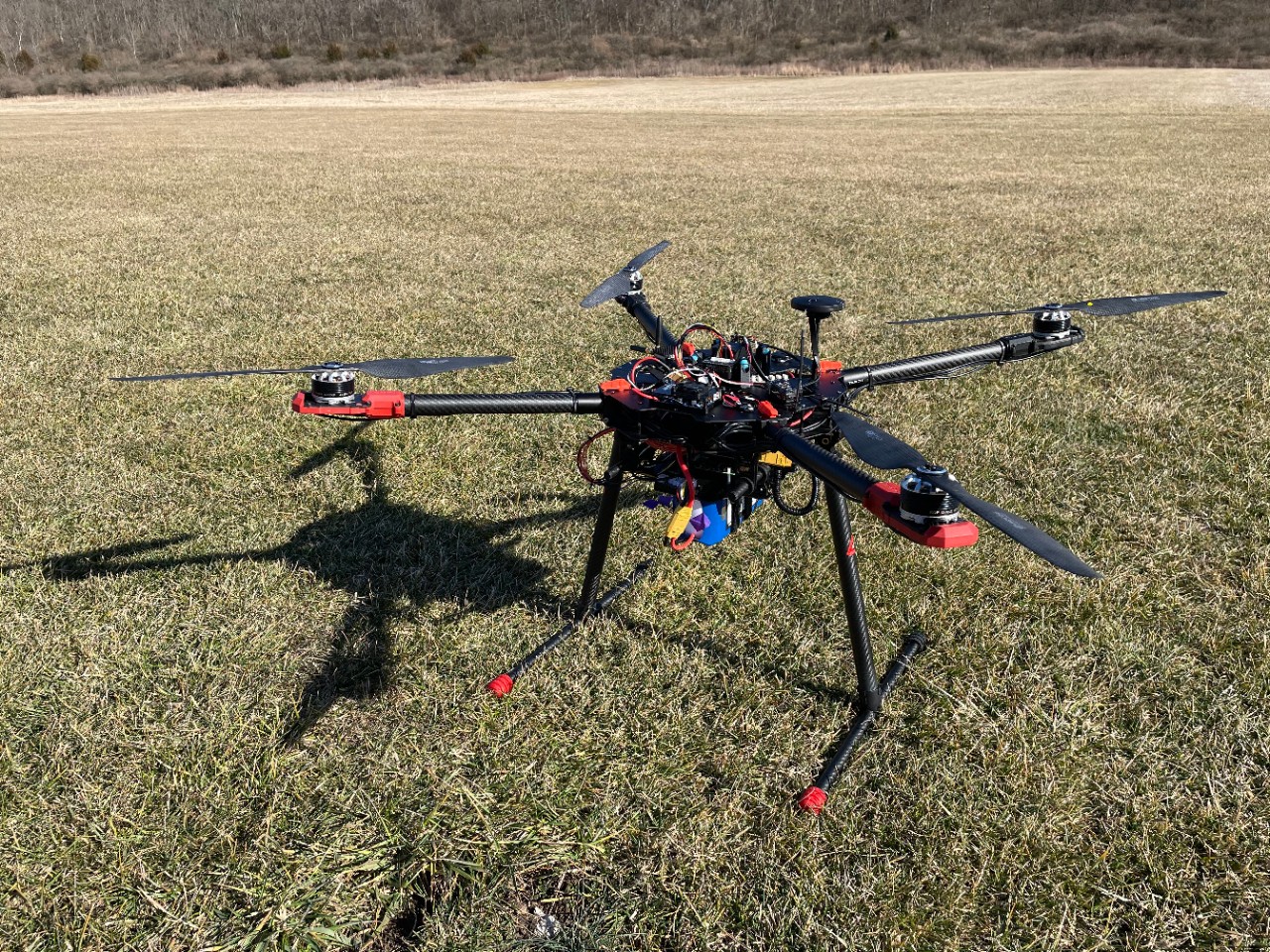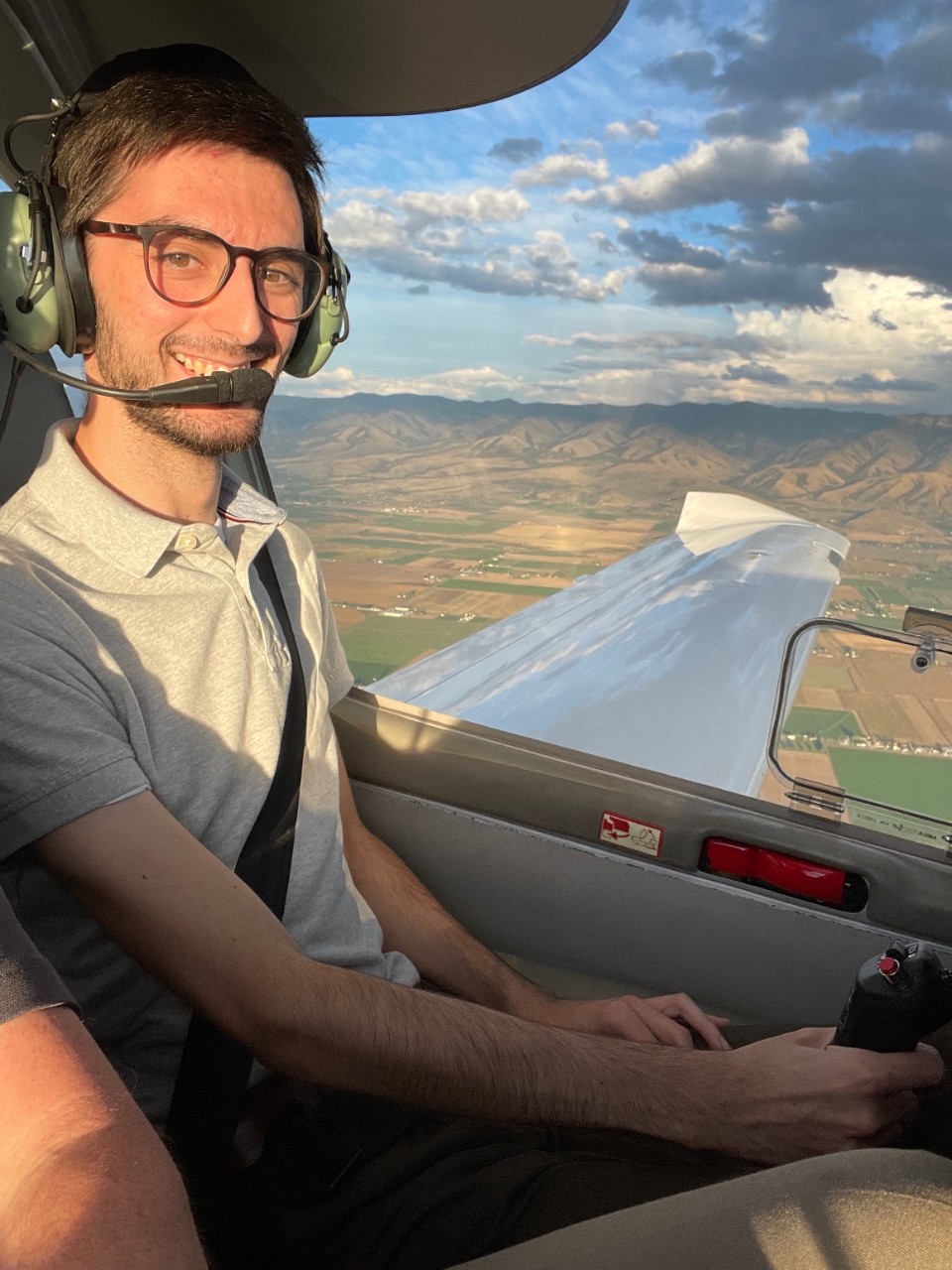
Aerospace engineer studying electric aircraft battery health
Jon Ander Martin turned his childhood interest of airplanes into a career
After earning his bachelor's in mechanical engineering from the University of the Basque Country (EHU) in his home country of Spain, graduate student Jon Ander Martin came to the University of Cincinnati through a dual degree partnership between the two universities. Inspired by a lifelong fascination with aviation, he earned his master's in aerospace engineering and continued at UC for his Ph.D. program.
His research project focuses on battery health management of Unmanned Aerial Vehicles for space exploration. He works under the guidance of Kelly Cohen, professor of aerospace engineering, and was selected as Graduate Student Engineer of the Month by the College of Engineering and Applied Science.
How did you end up choosing UC?
I got my bachelor's degree at the University of Basque Country (EHU) in Spain, but I have always been interested in studying in the U.S. The University of Cincinnati has a dual degree program with EHU, which allowed me to get a master's degree from each university at the same time. I later got the opportunity to continue my research and pursue a doctoral degree at UC's College of Engineering and Applied Science (CEAS). This was a great chance to further develop my work with the help of some of the best guidance I could possibly get.
Why did you choose your field of study?

Jon Ander Martin pilots a plane. He was 10 years old when he discovered his passion for airplanes. Photo/Provided
When I was 10 years old, I saw an old version of the Microsoft Flight Simulator in a store. I asked my dad to buy it for me, but he said that I was too young and that piloting a plane was difficult. That sounded like a challenge to me. After some weeks of bargaining with my dad, I ended up getting a copy of the game. The more I learned about planes and how they work, the more I enjoyed it. That's when my passion for aviation started.
I started saying that in the future I wanted my career to be related to aviation. I wasn't sure exactly what I wanted to be; I just wanted to have a job where I could be close to planes. Once I got to high school, I had several physics and math teachers who inspired me. From then on, it was clear that my path forward would be aerospace engineering, and I wanted to make an impact in the future of aviation.
Describe your research work. What problems do you hope to solve?
My research is focused on predicting the performance of propulsion batteries applied to electric aircraft. In the area of transportation, hybrid and fully electric cars are gaining importance because climate change is an issue that needs to be addressed. Planes, helicopters and multicopters should follow shortly to help us reduce the emissions in the aviation industry.
What are some impactful experiences you had while at UC?
College sports had a big impact on me when I arrived at UC. I grew up in Spain, where college sports don't exist. It was awesome to see that a university campus in the middle of the city could have a huge stadium, basketball arena, etc. I love going to cheer for the Bearcats football team!
Do you have any other hobbies or involvements you'd like to share?
I like to fly RC planes. It's something that I have always wanted to do but never had a good chance to start. Luckily, my lab colleagues and friends provided the perfect introduction by giving me training lessons. I also enjoy stargazing. I have been a volunteer at the Cincinnati Observatory, where I worked with some amazing and enthusiastic people that taught me a lot about our observatory and the universe.
What are you doing now?
I graduated in August 2023 and got a job with a start-up company in Utah. There, I will be applying the knowledge I obtained during graduate school and continue working on the development of electric powered aircraft.
Learn more
Discover engineering graduate programs at the College of Engineering and Applied Science.
Featured Image at top: Jon Ander Martin's research quadcopter. Photo/provided.
Related Stories
Mayor Pureval, Rob Richardson lead ethical AI symposium
July 5, 2024
As artificial intelligence rapidly integrates into everyday life, Rob Richardson, CEO and founder of Disrupt Now and MidwestCon and local tech startup partner of the University of Cincinnati 1819 Innovation Hub, recently spearheaded the Responsible AI Symposium with Cincinnati Mayor Aftab Pureval, calling upon community leaders to discuss and ensure artificial intelligence technologies help users rather than harm.
UC’s microchip training includes innovative VR
July 2, 2024
To build a virtual microchip factory, University of Cincinnati doctoral students turned to the real one where they work. UC launched a new training program for microchip manufacturing in advance of the new fabrication plant Intel Corp. is opening in Ohio.
UC grad’s innovative tech to manage ER wait times
June 25, 2024
When launching Teravus, a health care triage management startup, Jason Murray turned to the University of Cincinnati's Center for Entrepreneurship and the 1819 Venture Lab for guidance and funding.
Carnegie Foundation recognizes UC with Leadership for Public Purpose classification
June 24, 2024
UC part of inaugural group honored for focusing on developing students as leaders
Technology provides new understanding of voice, swallowing physiology
June 21, 2024
University of Cincinnati laryngology researchers are using high-speed camera technology to learn more about the physiology of voice and swallowing and improve patient outcomes.
Environmental engineer researches water treatment solutions
June 21, 2024
Katelin “Katie” Weitzel was first drawn to the University of Cincinnati by the esteemed College of Engineering and Applied Science, but her decision was solidified by the groundbreaking work of Dr. Dionysios Dionysiou in the Department of Chemical and Environmental Engineering. Weitzel’s interest in water treatment came from growing up in Michigan and witnessing firsthand the impact of a water crisis. During her time at UC she has been awarded the Rindsberg Fellowship, a Graduate Student Award in Environmental Chemistry, and recently was named Graduate Student Engineer of the Month by CEAS.
UC grad’s innovative design creates van life 2.0
June 20, 2024
Recktenwald combined his passion for adventure with a desire for versatility to birth Freedom Fans, a startup venture that mixes a camper van’s roof vent with a skylight.
Engineering’s gender gap narrows
June 20, 2024
UC's College of Engineering and Applied Science has launched the careers of many women across engineering disciplines. With much to celebrate, women say there is still more to do to reach equity in the workplace.
UC app helps people make voices more masculine, feminine
June 20, 2024
The Cincinnati Enquirer highlights a new voice-coaching app developed by UC College of Engineering and Applied Science Associate Professor Vesna Novak. Novak studies intelligent technologies to improve human health and wellness in her electrical engineering lab.
New AI predicts anxiety levels
June 18, 2024
A new form of artificial intelligence was developed that uses a short picture rating task and a small set of contextual variables to predict whether someone is experiencing anxiety.
